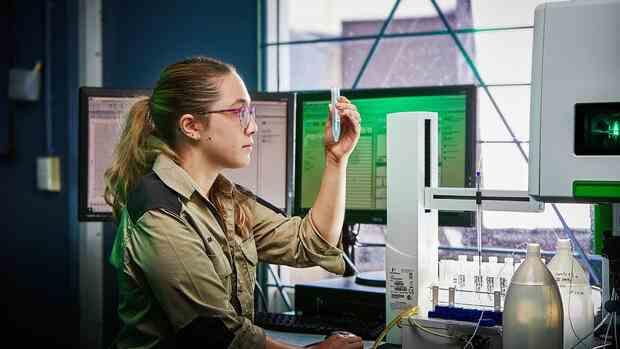The battery start-up Pure Battery Technologies is looking for proximity to the German car industry and wants to build up production capacities in Germany.
(Photo: Pure Battery Technologies)
Dusseldorf The Australian start-up Pure Battery Technologies (PBT) wants to produce the starting material for cathodes in Germany, which are required for the construction of electric car batteries. A pilot factory is to be built on a derelict site belonging to the chemical manufacturer Königswarter & Ebell in Hagen. The start of construction is planned for spring 2023. The goal is an annual production capacity of up to 15,000 tons of precursor cathode material. Translated into end products, according to PBT, this means that cathode material is produced for batteries in up to 150,000 cars the size of the VW ID 3.
For the time being, the system will only be used for demonstration purposes. PBT does not provide information on the time of full commissioning. For 2025, however, the company has set itself a turnover of 150 million euros in Germany alone. There are no purchase agreements yet, but the company is in negotiations with various customers. CEO Bernd Zikarsky says: “We are currently talking to numerous well-known investors, some of whom are private equity companies, some of whom are companies from the industry.”
PBT, a spin-off from the University of Queensland, is being supported in the construction of the production facility by the European Investment Bank (EIB) with a development loan of 36.7 million euros. That corresponds to half of the investment required to set up the factory.
By granting promotional loans to start-ups such as PBT, the EU wants to keep the car battery value chain in the member states, explains EIB officer Donata Riedel. PBT chose Germany as the location for its battery plant in order to be close to the German car industry and its electric car production, says Riedel.
Top jobs of the day
Find the best jobs now and
be notified by email.
The raw materials for the precursor cathode material – the metals nickel, manganese and cobalt – should come directly from mining or in the form of the so-called “black mass” that arises from the recycling of old batteries. PBT works with the German recycling company Cronimet and is in contact with the chemical industry and nickel producers. In the long term, PBT wants to get its raw materials from disused electric car batteries, but there are still not enough old batteries. “It will be a few years before large amounts of metal waste from batteries are available,” says Zikarsky.
The supply of metals from mines is therefore indispensable in the coming years. PBT is negotiating with mine operators in Australia, the Pacific and Africa.
>> Read here: This start-up wants to make mining greener with carbon batteries
In the future, the company wants to process the black mass itself in order to produce the cathode material from it. They do not describe in detail how this works. CEO Zikarsky says somewhat nebulously: “We have found a ‘Coca-Cola formula’ for the production of the nickel-based, active precursor cathode material. Nobody masters this process as energy-efficiently, environmentally friendly and cost-effectively as we do.”
PBT promises 70 percent less CO2 emissions in the entire production process. Other companies such as the chemical group BASF or the car manufacturer BMW also want to reduce the CO2 footprint of lithium-ion batteries. They are increasingly relying on the recycling of battery waste.
More: Lithium, copper, rare earths: Europe is gearing up for the global race for raw materials
